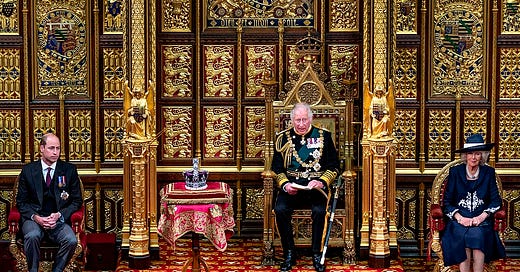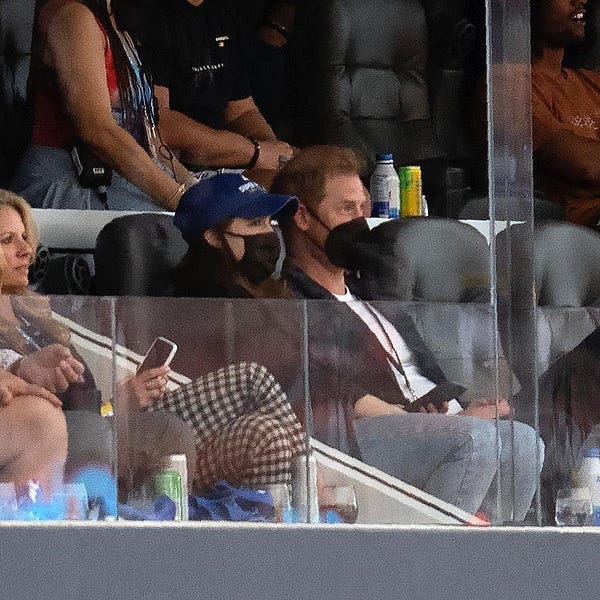The institution is vibrant and strong; whatever its problems at any given moment, it does have centuries of survival in its sails. It is the reality for many people, most of all, obviously, for the monarch, the consort, and the heir. King Charles, Queen Camilla, and Prince William are invested in the reality of the institution,1 with all its baggage, all its problems, all its perks, and all its drawbacks. On Thursday night, while Netflix “dropped” Volume 2 of the docu-series Harry & Meghan, those invested in the reality of the Institution put on a “united front.” The Royal Rota was united in their coverage as well. All the headlines were the same. The royal family (minus far away Harry and Meghan) smiled, hugged, kissed, and enjoyed a feel-good evening at Westminster Abbey for the filming of the event that will air on Christmas Eve.
This is monarchy is 2022. To say that monarchy is anachronistic would be to state the obvious. And yet so many of us, no matter where we live—whether we live in the British Isles, the Commonwealth, or a former colony—so many of us feel connected to this “family on the throne.”2 We love to see them happy. We love to see them in love. We celebrate their weddings. We mourn their deaths. We genuinely feel sadness through their tragedies. Even if we are not invested in the same way as the King and the Prince of Wales, we have an emotional—perhaps even a deeply psychological—investment. I won’t speak about psychology, per se, because it’s not my area, but I do think the emotional ties and mental attachments run deep for many of us. We have fixed ideas about monarchy, whether we love or hate it, whether we think it’s just or unjust. We feel one way or another about Diana; whatever we feel about her, it’s strong. Her sorrows, her joys, they either tug at our heartstrings, or… we try to pretend that we don’t care. Most of us care, if we’re being honest. We do feel compassion for these humans who are shoved in our faces by the media. A lot of us are more dismissive than others, but even those who roll their eyes and say, “whatever, it’s not my concern,” they can’t help what they feel. Defenders of the Institution bristle about The Crown on Netflix. The fictional series challenges their sense of reality. Fiction often does this. At its most powerful, fiction can help us to perceive reality in new ways. It can even help us expand our consciousness.
The ego fights to protect its reality. The only thing stronger than the ego is Consciousness, with a capital C, but most of us are walking around completely separate from Consciousness. I was delighted when Harry mentioned Unconsciousness in, I think it was Episode 3. It might have been 2. Anyway, I remember very well what he said. He was talking about the unconscious bias he experienced in the Institution, particularly after the “Nazi armband” incident. That was the opening for him to begin to think outside of his box, to consider things in new ways. His military service in Afghanistan gave that rising consciousness momentum. Falling in love with Meghan and having children clinched it for him.
I began this journey, watching Harry & Meghan, with a good bit of bias. I documented that. Over the course of the past five articles—six, including this one—you can see my shifting consciousness. (I vacillated in tone, variously serious and sarcastic, but that was just me working through it my own way.) Before I even watched it, oh boy, did I have misgivings! I was skeptical of what I perceived to be the over-the-top love story. I was cynical about the “poor me” narrative. Episode 3 had a powerful effect on me. It helped me to recognize what they had been dealing with. In Episode 5, we are told of the Bot Sentinel research and reports on the social media attacks on Harry and Meghan. Bot Sentinel’s investigation revealed that several Royal Rota Twitter accounts had interacted with “hate” bots specifically created to assassinate the characters of Harry and Meghan.3 Yet, through Episode 4 and even part of 5, I clung to the idea that maybe, just maybe they hadn’t given the Institution enough of a chance. I still wondered if it was generational impatience that prompted them to give up so soon. They might have pushed through, kept the light of Consciousness strong, and might have been in a position to change the System from within. And then I finished Episode 5, and I saw how fiercely the Institution fought to preserve itself. The Bot Sentinel revelations are quite shocking. Very prominent royal reporters and even Meghan’s own half-sister were implicated in the hateful storm that has swirled around the couple ever since their engagement was announced but which gained momentum after their notorious exit from “working royal” life.
When we talk of the Institution, we don’t just mean the Family. We mean the Household, the Royal Rota, and all the people whose livelihoods and social and political relevance might be connected to the monarchy. All these realities are tied together by the preservation of the Institution. Egos invested in that paradigm are what are truly attacking Harry and Meghan, calling Meghan a liar, calling Harry selfish, calling them both narcissistic, whatever. If the paradigm falls apart, the ego loses its sense of reality, indeed it loses its whole sense of identity. What is it fighting for if the Institution is not real, or rather, if it’s anachronistic, racist, and rubbish?
The light of Consciousness is behind every ego. It’s just that those of us who are entirely identified with the ego cannot sense it. Identification with the ego keeps us in the dark. Meghan alluded to this (without using the exact words) when she talked about the connection between herself and Harry. I think it was Episode 3. In the part about the wedding, as we saw her arrive at the altar, she remarked on her and Harry’s ability to always “see” each other in the chaos. “Find” each other, rather; that might have been what she said. She definitely said, it wasn’t that nothing else mattered, but when they “find” or “see” each other in the chaos around them, they realize intensely how temporary everything else is. She gets it; she understands that the form reality takes all around us—the chaos, as she said—is temporary, and that’s what the ego attaches itself to. The Consciousness—the true You, the true Harry, the true Meghan, the true Me—that’s permanent. That’s forever. That’s what lives even when the ego’s reality changes or simply falls away.
I’m glad to realize that Harry and Meghan are not entirely forsaken. Some family members will double down on the side of the Institution. That’s a forgone conclusion. But some family members have kept the door open for the couple. We’ve seen Harry maintain his always-close friendship with his cousin Princess Eugenie. (She took her family to visit his and to attend the Super Bowl LVI.)
Even if Harry and Meghan have no pathway back to full-on royal life (and I do feel fairly confident that ship has sailed) at the very least there is always the chance for their private relationships to evolve and expand in the light, and Love, of Consciousness.
My final award for the series: Five Stars. In my second article4 as part of this journey, I complimented Archie’s appearances through the series. He proved himself quite the little superstar and I wouldn’t scoff at his nomination at the Emmys.
I’ll keep calling it the Institution, with a capital I. You might recall that episode 2 of season five in Netflix’s The Crown was titled, “The System.” It has the same meaning.
Borrowing the words of Walter Bagehot seems appropriate here.






